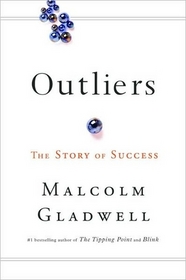Helpful Score: 7
Outliers is a book that challenges the notion of what makes a person successful, and that anyone is a self-made millionaire. This book has implications well beyond Blink or Tipping Point, to looking at what can be done to improve the US education system, educational expectations, becoming an expert, or to make "prodigies"/geniuses. Another fascinating section addressed why southerners in the US are so quick to anger/feuding - I wanted all my southern friends to read this book and see if they could address their anger issues! Had some insights into why certain immigrant groups succeeded when they arrived, while others continued to linger in poverty. Many of the chapters in this book were so mind-blowing, I hope that people can get these ideas out into the general discourse and change the way people act/think and public/corporate policies.
Helpful Score: 7
Malcolm Gladwell's latest bestseller addresses success - why some people such as Bill gates rise above the rest to phenomenal success. He terms these people "Outliers."
The chapters all follow a format which Gladwell likely has likely used frequently in his magazine writing: he begins by telling a story of an interesting individual or group of people, then proceeds to expand upon his example to make his point. The early chapters which address the influence of birth month on the chances of athletic and academic success and his study of Bill Gates are the most interesting. One overly-lengthy chapter concerning a group of immigrants slowed the momentum of the book, as did the author's telling of his own family history. Fortunately, the chapters that are good are really, really good: easy to understand and insightful.
Gladwell is one of the few non-fiction writers who can consistently appeal to the masses. There are enough interesting tidbits here to keep his appeal going.
The chapters all follow a format which Gladwell likely has likely used frequently in his magazine writing: he begins by telling a story of an interesting individual or group of people, then proceeds to expand upon his example to make his point. The early chapters which address the influence of birth month on the chances of athletic and academic success and his study of Bill Gates are the most interesting. One overly-lengthy chapter concerning a group of immigrants slowed the momentum of the book, as did the author's telling of his own family history. Fortunately, the chapters that are good are really, really good: easy to understand and insightful.
Gladwell is one of the few non-fiction writers who can consistently appeal to the masses. There are enough interesting tidbits here to keep his appeal going.
Helpful Score: 3
This was an interesting book, I read it in one sitting. However, it was different from what I expected. I assumed the author would lay out the reasons some people were more successful and then give the template. Instead, this book is truly a thesis in book form. Each chapter forms a case study of a specific example and he tells the story and then leads you down the path of how all of the "just right" circumstances allowed this person to succeed by dint of their month of birth, year of birth, race, etc. Very interesting to read but don't expect any practical advice you can use in your own life!
Helpful Score: 1
A Nonfiction selection for my March bookclub. A book of many examples of successful people and what their common denominators are. At times interesting and at other times I just got distracted with all the footnotes. But as always glad that I have read a book that I normally would not choose.
Helpful Score: 1
Incredibly interesting! This book really stayed with me.
What the Dog Saw is also a great read.
What the Dog Saw is also a great read.




